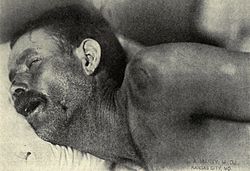Meningitis

Meningitis is an infection of certain membranes and tissues of the nervous system. Those are called meninges (singular: meninx). Their function is to protect the central nervous system. Most often, this infection is caused by microorganisms, like viruses, bacteria, fungi or parasites. The most common cause of meningitis are viruses, followed by bacteria. Meningitis is a life-threatening condition. It affects all age groups.
Some kinds of meningitis are very easy to spread. For this reason, in certain countries, like Germany, doctors have to tell the authorities that someone might have meningitis.
Signs of meningitis
Some signs of meningitis can be: high fever, sometimes with chills; very strong headache; nauseas and vomiting; drowsiness or confusion; twitching; sleepiness; sore throat; delirium (especially in children); seizures; and stiff neck (in less than 50% of the cases, but may be a telltale sign).
Types
The two main forms of meningitis are bacterial meningitis and viral meningitis. In bacterial meningitis, most patients die without treatment, whereas in viral meningitis most patients get better on their own. Herpes virus meningitis may respond to an antiviral drug.[1]
Meningitis Media
Charlotte Cleverley-Bisman developed severe meningococcal meningitis as a young child; in her case, the petechial rash progressed to gangrene and required amputation of all limbs. She survived the disease and became a poster child for a meningitis vaccination campaign in New Zealand.
Gram stain of meningococci from a culture showing Gram-negative (pink) bacteria, often in pairs
Histopathology of bacterial meningitis: autopsy case of a person with pneumococcal meningitis showing inflammatory infiltrates of the pia mater consisting of neutrophil granulocytes (inset, higher magnification).
Disability-adjusted life year for meningitis per 100,000 inhabitants in 2004.*Template:Legend-col*
Demography of meningococcal meningitis. meningitis belt epidemic zones sporadic cases only
Deaths from meningitis per million people in 2012 Template:Legend-col
Related pages
- Encephalitis, the inflammation (swelling) of the brain
References
Other websites
- Meningitis at the Open Directory Project
- WHO: Meningococcal meningitis
- Merck Manual: Central nervous system infections
- Vaccination information from the NHS, UK Archived 2006-10-31 at the Wayback Machine
- CDC: Meningococcal disease Archived 2007-06-17 at the Wayback Machine
- CNN Health Library, Meningitis Archived 2007-10-26 at the Wayback Machine
- Information on Meningitis UK and the charity's search for a vaccine Archived 2007-10-18 at the Wayback Machine
- Information from the Meningitis Trust Archived 2007-10-18 at the Wayback Machine
- Information from the Meningitis Trust in New Zealand Archived 2008-07-25 at the Wayback Machine









